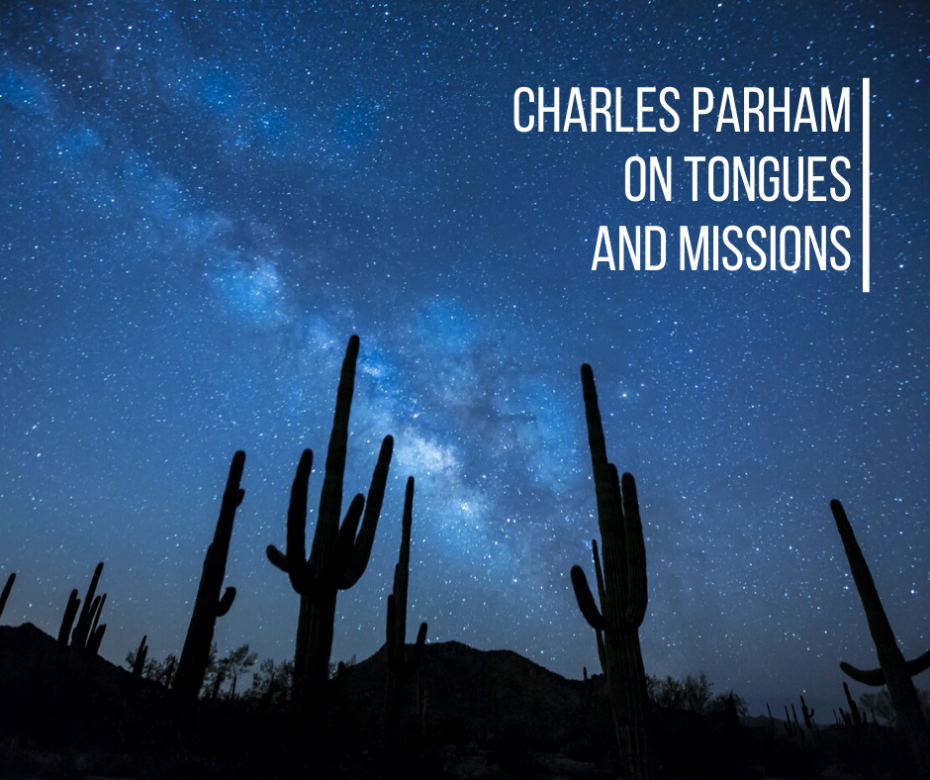I came across an interesting admission in a footnote in a book about Pentecostalism, missions, and speaking in tongues.
The Topeka Outpouring of 1901, a book edited by Larry E. Martin, gives the reader a documentary history of the beginning of the Pentecostal movement. Long story short, in 1900, a man named Charles Parham opened a Bible school in Topeka, Kansas. It was in the Holiness tradition, but Parham was seeking a deeper experience of the Holy Spirit. He gave the students an end-of-term project. As heexplained, “The main object of this study was to discover the real Bible evidence of this baptism so that we might know and obtain it, instead of being confused by the chaotic claims of modern Holy Ghost teachers” (p. 78, emphasis added).
Just before New Year’s, the students regathered to share their conclusions. They were surprised to find they all agreed the Biblical evidence for the baptism was speaking in tongues. Thus, they began to pray for that sign.
On New Year’s night, Agnes Ozman was the first student to allegedly speak in tongues. As Parham tells it, “she began speaking in the Chinese language, and was unable to speak English for three days. When she tried to write in English to tell us of her experience she wrote in the Chinese language, copies of which we still have in newspapers printed at that time” (p. 63, emphasis added).
I searched for examples of her writings and found this (see here). That looks like scribble to me, but I don’t know Chinese, so I sent the pic to a Chinese friend from college.
He said, “I have to admit, a number of stroke-clusters here seeming to bear the resemblance to a character—one may argue they are like certain Chinese characters ‘in the making.’”
A Chinese character is made up of identifiable “componential strokes,” he explained. “I’ve to say a lot of those strokes are present, esp on the left-half of your pic.”
He thought the first character bore a resemblance to “Ephesians.”
But when I asked if there was a discernible message, let alone a Biblical one, he said there was not. Ozman’s “Chinese” had no message in Chinese. (Why did Parham claim it was Chinese? Why did she? How did they know? Because it sounded vaguely Chinese?) I have to conclude, then, that if that is one of her writings, then Ozman’s claim of speaking in tongues has been falsified. Based on the only objective evidence left, her experience was not genuine. But what about the others?
As I mentioned, Parham thought the sign was speaking a known language. He thought that was essential for missions. He also thought it was a waste of time and resources for missionaries to learn a foreign language by conventional means:
“And how much better it would be for our modern missionaries to obey the injunction of Jesus to tarry for the same power: instead of wasting thousands of dollars, and often their lives in the vain attempt to become conversant in almost impossible tongues which the Holy Ghost could so freely speak. Knowing all languages, He could as easily speak through us one, as another, were our tongues and vocal cords fully surrendered to His domination” (pp. 71-72).
Many early Pentecostals took this to heart. They truly believed that they spoke Zulu, or Chinese, or Hindi, and went around the world expecting to be able to speak to the natives in their language. How did that work out?
Larry Martin, the editor, adds a telling footnote:
“In the earliest days of the Pentecostal outpouring, it was common to believe that missionaries would go to foreign countries and be able to minister without learning the language of the land. Parham and others believed that the gift of tongues would be sufficient. Unfortunately, many sincere missionaries were disappointed and left their field of labor without the success for which they had hoped” (p. 72, note).
In fact, if this Grace to You article is right, things went very poorly for those early Pentecostal missionaries (see here). More proof that their experiences were not genuine?
According to this site, there are 3384 translations of the Bible. So far as I know, no translation was made by a Pentecostal who supernaturally learned a new language. They were all done the hard way.
I sympathize with Parham and Ozman and these early Pentecostals. I would prefer to blame their apparent excesses on gullibility, not malice.
Parham was skeptical of “the chaotic claims of modern Holy Ghost teachers.” But he should have been more skeptical of his own.
[Edit 6/15/21: Ernest S. Williams, a Pentecostal theologian, cautioned against thinking tongues are for evangelism. That is not their purpose. “The speaking did not involve messages of instruction, but rather words of praise,” he explained. “[L]et none think that the speaking in tongues is for world evangelism” (Systematic Theology, p. 3:50). I assume he would also say they are not for translating Scripture.]


